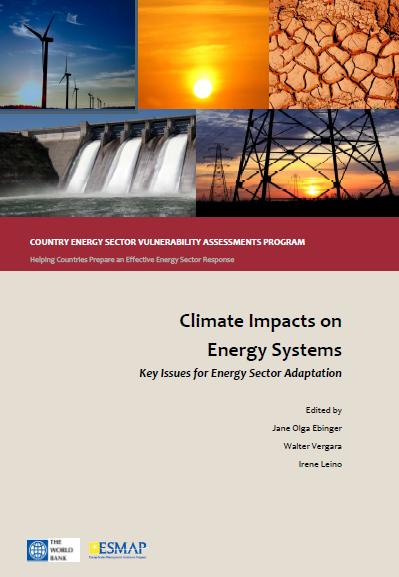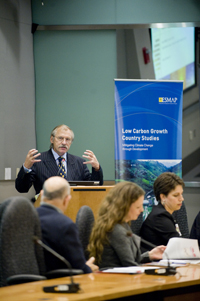News
 The climate is changing as a result of anthropogenic greenhouse gas (GHG) emissions that are now estimated to surpass the worst case emission trajectory drawn under the Intergovernmental Panel on Climate Change (IPCC) in its third assessment report. This report Climate Impacts on Energy Systems, Key Issues for Energy Sector Adaptation highlights not only the urgency of action to control emissions, but also the need to adapt to unavoidable climate consequences from the damage induced in the biosphere. Already the entire energy supply chain is significantly vulnerable to climate variability and extreme events that can affect energy resources and supplies as well as seasonal demand; the projected changes will increase this vulnerability and thus the need to adapt to changing conditions.
The climate is changing as a result of anthropogenic greenhouse gas (GHG) emissions that are now estimated to surpass the worst case emission trajectory drawn under the Intergovernmental Panel on Climate Change (IPCC) in its third assessment report. This report Climate Impacts on Energy Systems, Key Issues for Energy Sector Adaptation highlights not only the urgency of action to control emissions, but also the need to adapt to unavoidable climate consequences from the damage induced in the biosphere. Already the entire energy supply chain is significantly vulnerable to climate variability and extreme events that can affect energy resources and supplies as well as seasonal demand; the projected changes will increase this vulnerability and thus the need to adapt to changing conditions.
Key Messages
1. Energy services and resources will be increasingly affected by climate change.
2. All evidence suggests that adaptation is not an optional add-on but an essential reckoning on par with other business risks.
3. Integrated risk based planning processes will be critical to address these impacts and harmonize actions within and across sectors.
4. Awareness, knowledge and capacity impede mainstreaming of climate adaptation into the energy sector.

The report presents an overview of how the energy sector might be impacted by climate change and what options exist for their management. It focuses on energy sector adaptation, draws on available scientific and peer reviewed literature, and takes the perspective of the developing world to the extent possible.
At the report launch on November 16, presentations were made by editors and authors of the paper, Walter Vergara of the World Bank Group’s Global Expert Team for Adaptation and Jane Ebinger of the Energy Sector Management Assistance Program (ESMAP). They recognized the contributions from a broad range of external specialists (including among others the UNEP Risoe Center, CSIRO Australia, ClimDev Africa, Federal University of Rio De Janeiro, University of Oxford, Basque Center for Climate Change, Danish Meteorological Institute). The report is intended as an up to date compendium of what is known about weather variability and projected climate trends and their impacts on energy service provision and demand. It discusses emerging practices and tools for managing these impacts and integrating climate considerations into planning processes and operational practices in an environment of uncertainty. The target audiences for the report are policy makers and energy planners and practitioners in developing countries.
Discussants Lester R. Brown from the Earth Policy Institute and Letha Tawney from the World Resources Institute brought external perspectives to this discussion. Brown’s feedback focused on the need to disseminate knowledge and turn it into action by decision makers. The challenge lies in bridging the dialogue between policy makers and scientists. He noted the relevance of the report and reiterated the great sense of urgency for this information to be placed in the hands of those designing policies so they are climate smart. Tawney complemented his points by emphasizing that mitigation should always be the first low cost adaptation option, and that there is a great need to disseminate information on adaptation pilots and success stories taking place around the world.
Speakers Bios, Presentations and the Executive Summary of the Report can be found below.
